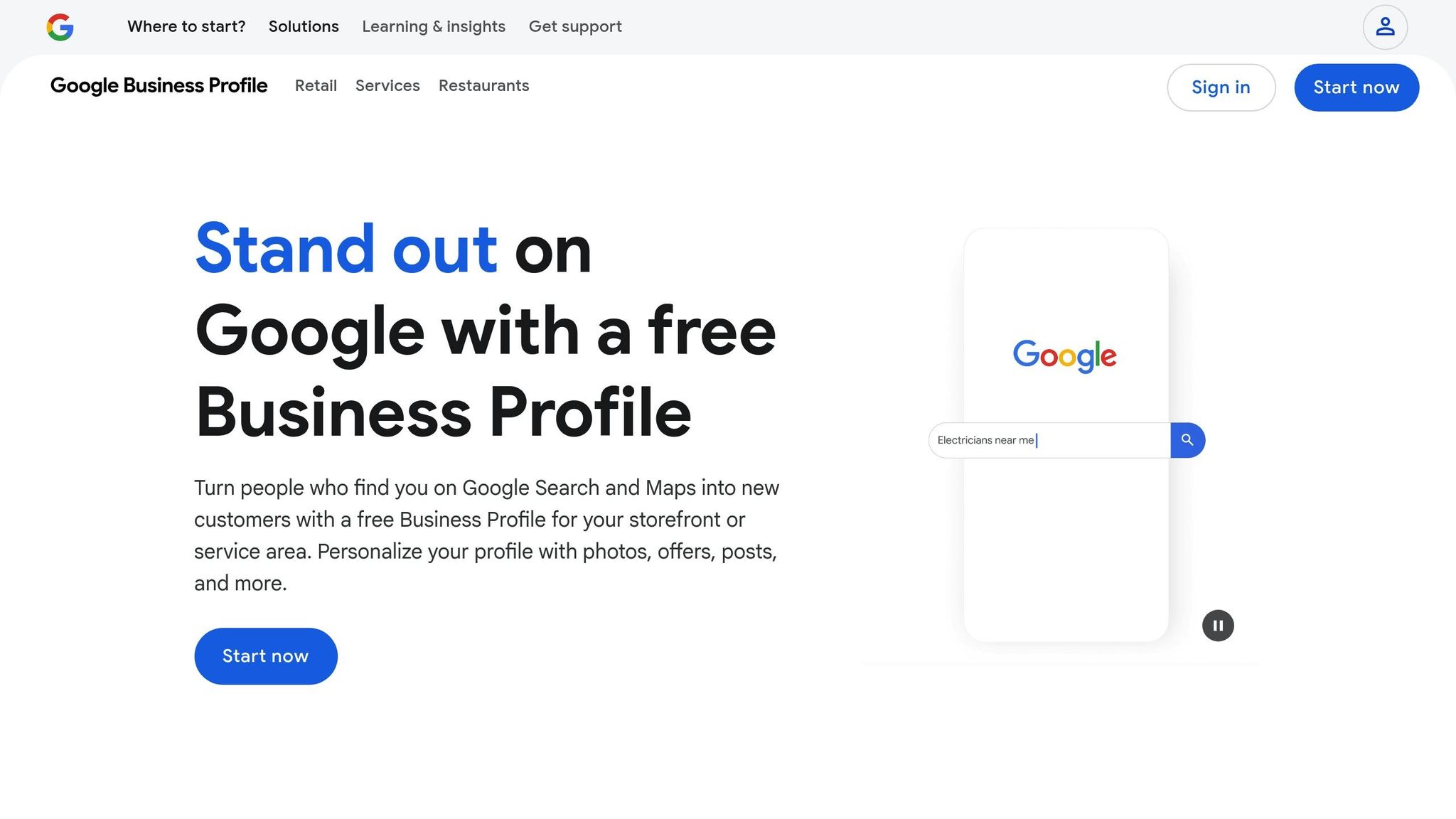SEO can be a game-changer for Austin startups looking to grow in a competitive market. By focusing on local SEO, technical optimizations, and keyword strategies tailored to Austin’s audience, startups can boost visibility, attract high-quality leads, and compete with larger companies.
Here’s a quick breakdown:
- Local SEO: Claim your Google Business Profile, ensure consistent business information, and build local citations to improve visibility in Austin-specific searches.
- Keyword Strategy: Use location-based keywords like “Austin tech consulting” to target local search behavior and improve conversions.
- Technical SEO: Optimize website speed, mobile performance, and crawlability to ensure search engines can index your site effectively.
- Long-Term Approach: Regular SEO audits, updated content, and performance tracking are crucial for maintaining growth momentum.
Whether you’re a fintech, e-commerce, or healthtech startup, SEO offers a cost-effective way to stand out in Austin’s thriving business scene. Start with foundational optimizations and scale your efforts as you grow.
Alex Talks to Startup Founders About SEO (Founders Common)

Local SEO Strategies for Austin Startups
In Austin’s bustling business scene, standing out means paying attention to every detail – especially when it comes to local SEO. For startups looking to thrive online, having a strong local presence is a must. A great starting point? Make sure your business information is accurate and consistent across the web.
Setting Up Your Google Business Profile

Your Google Business Profile (GBP) is the cornerstone of local SEO. First, claim your profile if you haven’t already. Then, double-check that your business name, address, and phone number (NAP) are consistent across all platforms. This consistency helps search engines trust your business and improves your visibility in local searches. Don’t stop there – take the time to manage and respond to reviews. Engaging with customer feedback not only boosts your credibility but can also give your rankings a helpful nudge. To further solidify your local presence, expand your reach by building additional online citations.
Building Local Citations
Citations – mentions of your business name, address, and phone number on other websites – act as trust signals for Google. Think of them as digital breadcrumbs leading customers back to you. To make the most of them, ensure your NAP details are consistent across every citation you create. This attention to detail not only strengthens your local SEO but also ensures that potential customers always find the right information about your business.
Keyword Research and Technical SEO for Austin Startups
A well-planned keyword strategy can be the foundation of your startup’s online visibility. Austin’s vibrant and competitive market requires a strategy that balances local search trends with your broader business goals. Alongside this, technical SEO ensures your website is accessible and understandable to search engines. Even the best content won’t perform if your site isn’t crawlable. Start by pinpointing the keywords that resonate with Austin’s audience.
Finding Keywords for Austin’s Market
Begin by focusing on keywords that reflect local search behavior in Austin. For example, instead of just targeting "software development", aim for phrases like "software development Austin" or "Austin tech consulting." These longer, location-specific phrases often face less competition and attract users with a clear local intent, leading to better conversion rates.
Tools like Google Keyword Planner are great for uncovering relevant keywords. Additionally, analyze what your competitors rank for to identify keyword gaps you can fill. Don’t overlook seasonal trends – Austin’s famous SXSW, for instance, drives unique search patterns that startups can leverage for visibility.
Consider the entire buyer’s journey when selecting keywords. Early-stage prospects might search for "how to choose a marketing agency in Austin", while those ready to make a decision might look for "Austin marketing agency pricing."
Local mobile search behavior is another key factor. Austin residents frequently use their phones for "near me" queries while on the move. Incorporate these patterns into your strategy to capture mobile users effectively. Services like SearchX’s keyword research can help identify these opportunities and create a tailored keyword map for Austin’s market.
By aligning your keywords with local search habits, you’ll better connect with Austin’s audience and their needs.
Improving Website Speed and Mobile Performance
Fast-loading websites are critical – pages that take more than 3 seconds to load often see a spike in bounce rates. Technical improvements not only enhance user experience but also support your SEO efforts by ensuring your site performs well for Austin-based visitors.
Start by optimizing images. Use modern formats like WebP and implement lazy loading to reduce load times. These small changes can significantly boost your site’s speed.
Since Google uses mobile-first indexing, your rankings depend heavily on how your site performs on mobile devices. Test your site on actual smartphones, not just browser developer tools. Pay attention to navigation, button sizes, and text readability to ensure a smooth experience on smaller screens.
For blog posts and news content, consider implementing Accelerated Mobile Pages (AMP). While not necessary for every page, AMP can dramatically improve mobile load times and boost your visibility in mobile search results.
To further enhance performance, use Content Delivery Networks (CDNs). CDNs serve your content from servers closer to your Austin audience, reducing load times and improving overall user experience.
Once your site’s performance is optimized, focus on ensuring search engines can properly index your content.
Setting Up Proper Indexing and Crawlability
Your XML sitemap is like a roadmap for search engines, guiding them through your site and highlighting updates. Submit your sitemap to Google Search Console and keep it updated as you add new content.
Review your robots.txt file to ensure it’s not unintentionally blocking important sections of your site. Use Google Search Console’s robots.txt tester to verify everything is accessible to search engines.
A solid internal linking structure is also essential. Link from high-authority pages to key service pages using descriptive anchor text. This not only helps search engines understand your site’s hierarchy but also distributes page authority effectively.
Monitor for crawl errors using Google Search Console. Issues like 404 errors or server problems can prevent proper indexing. Fix broken links quickly and use 301 redirects when pages are moved or removed.
Lastly, implement schema markup to help search engines interpret your content better. For Austin startups, local business schema is especially useful. It can enhance your local search presence by displaying additional details like operating hours, reviews, and contact information in search results.
Implementing SEO for Long-Term Success
Once you’ve optimized your local presence and technical setup, the next step is to focus on maintaining that progress with long-term SEO strategies. Think of SEO as a marathon, not a sprint – it requires ongoing attention and effort. Companies that succeed with SEO treat it as a continuous investment, allowing their efforts to build momentum over time. The key is to create systems that keep your strategy consistent while staying flexible enough to respond to changes in search algorithms and market dynamics.
Running Regular SEO Audits
Regular audits are essential to keep your SEO strategy on track. By reviewing keyword rankings, organic traffic, and conversions, you can quickly spot trends and identify areas that need attention. For example, if a page drops in rankings or experiences a decline in traffic, it might signal a technical issue or outdated content that needs refreshing.
Technical audits are particularly important. Issues like broken links, slow-loading pages, or crawl errors can harm your visibility, especially in competitive markets. Tools like Google Search Console can help you monitor for new errors and address them promptly, ensuring your site runs smoothly.
Content audits are equally vital. Every six months, review your blog posts and service pages to ensure they remain accurate and relevant. In a fast-moving environment like Austin’s startup scene, outdated content about local trends or industry developments can hurt both your credibility and rankings.
Don’t overlook local SEO during these audits. Make sure your Google Business Profile is up-to-date, look for new citation opportunities, and keep an eye on online reviews. Local rankings can shift rapidly, especially as new competitors emerge in the Austin market.
By documenting your audit findings and acting on them quickly, you can make immediate improvements and measure progress over time. This proactive approach ensures that no detail goes unnoticed.
Using SEO Tools for Better Results
The right tools can simplify your SEO efforts and uncover insights you might otherwise miss. Start with free options like Google Search Console and Google Analytics to monitor your site’s performance.
When it comes to keyword tracking, focus on weekly trends rather than daily fluctuations. Rankings naturally vary day-to-day, so it’s more important to look at the bigger picture. Track both your primary keywords and long-tail variations to get a full understanding of your visibility.
Technical monitoring tools can alert you to issues like site downtime, slow page speeds, or crawl errors. Setting up automated alerts ensures you can address problems immediately, rather than waiting for your next audit to discover them.
For a deeper dive, consider professional services like SearchX’s technical SEO services. These audits can highlight optimization opportunities that require specialized expertise to resolve effectively.
Competitor monitoring is another valuable tactic. Keep track of the keywords your competitors rank for and identify content gaps you can fill. This kind of intelligence helps you make smarter decisions about where to focus your efforts in Austin’s competitive startup environment.
Remember, tools are only as useful as the actions they inspire. Focus on collecting data that aligns with your business goals, and use those insights to refine your SEO strategy.
Building a Complete SEO Plan
Your SEO strategy should align with your startup’s growth goals and available resources. Start with optimizations that offer the most impact for the least effort, and gradually tackle more complex strategies as you grow.
Content planning is at the heart of any successful SEO strategy. Develop an editorial calendar that balances evergreen topics with timely content tailored to Austin’s business community. Consider seasonal trends, local events, and industry updates that resonate with your audience.
For link building, take a systematic approach. Reach out to Austin-based publications, industry blogs, and local business directories to secure quality backlinks. Building relationships with other startup founders, local journalists, and influencers can also lead to valuable mentions of your business.
Consistency is key when it comes to on-page optimization. Use standardized templates for title tags, meta descriptions, and header structures to maintain quality as you scale your content production. This ensures your site remains well-organized and user-friendly.
Local SEO should be woven into your broader strategy. Incorporate Austin-specific keywords naturally into your content, participate in local business events, and collaborate with other companies in the area. These activities not only boost your SEO but also support your overall business growth.
Set realistic expectations for results. SEO often takes 3-6 months to deliver noticeable improvements, and more competitive keywords may require even longer. Plan your budget and goals with this timeline in mind, focusing on consistent progress rather than quick fixes.
Finally, measure your ROI by tracking how organic traffic translates into leads and customers. Tools like SearchX’s ROI measurement guide can help you connect your SEO efforts to business outcomes. This data not only justifies continued investment but also helps refine your strategy as your business evolves.
As your startup grows, your SEO plan should grow with it. Whether you’re entering new markets or launching new products, adapt your strategy to support these changes while maintaining the strong foundation you’ve built in Austin.
Conclusion: Growing Your Austin Startup with SEO
SEO is more than just a marketing tool for Austin startups – it’s the backbone of sustainable growth and measurable success. As we’ve explored, thriving in Austin’s competitive tech scene requires a smart blend of local visibility, technical excellence, and consistent effort.
Key Takeaways
The most successful startups in Austin know that local SEO and technical optimization are two sides of the same coin. Both are essential for building a strong online presence.
Local SEO delivers immediate results. Did you know that 76% of people who search for a nearby business visit one within 24 hours? Even better, 28% of those searches lead to a purchase. For Austin businesses, ensuring your contact details and business hours are easy to find is critical – 85% of local consumers say this information is a top priority when researching businesses.
Building credibility is key. By showcasing local testimonials, earning industry certifications, and demonstrating a deep understanding of the Austin market, you can establish the trust and authority that both customers and search engines value. SEO isn’t just about climbing the rankings; it’s about becoming a trusted name in your industry.
Performance tracking should take a dual approach. The best-performing startups in Austin don’t just track SEO metrics – they connect them to local performance data. This combined perspective helps uncover optimization opportunities that might otherwise go unnoticed.
With these insights in mind, the next step is turning them into action.
Next Steps for Austin Startups
To make these takeaways work for your startup, start by laying a strong foundation. Conduct an SEO audit: update your Google Business Profile, improve your website’s loading speed, and ensure your local citations are accurate and consistent. These basics are crucial before diving into more advanced strategies.
Define your budget and set clear, long-term goals for your SEO efforts.
Adapt your strategy to Austin’s unique market. Pay attention to local user behavior, mobile usage trends, and even regional language quirks. Austin’s tech-savvy audience offers plenty of opportunities for those willing to tailor their approach.
For more complex SEO tasks, don’t hesitate to seek professional help. While you can handle many basics in-house, technical audits and advanced optimizations often require specialized expertise to achieve the best results.
Finally, focus on the metrics that matter most. Tie your SEO efforts directly to business outcomes like lead generation, customer acquisition, and revenue growth. This data not only demonstrates the value of your investment but also helps you refine your strategy as your startup grows.
FAQs
What are the best local SEO strategies for Austin startups to grow their online presence?
To boost their online visibility, Austin startups should prioritize a handful of effective local SEO tactics:
- Keep your Google Business Profile (GBP) polished: Make sure all details are accurate, upload high-quality photos, and encourage customers to leave reviews. Engaging with reviews – both positive and negative – can help build credibility and connection with your audience.
- Target Austin-specific keywords: Find and use keywords that locals are searching for, such as "Austin tech startups" or "top coffee shops in Austin." These terms can help your business appear in relevant local searches.
- Strengthen local backlinks and citations: Collaborate with other local businesses, become a member of the Austin Chamber of Commerce, and list your company in local directories. These efforts can boost your website’s authority and visibility.
- Produce content with a local flair: Write blog posts or create resources that focus on Austin-related topics like community events, neighborhood guides, or trending local news. This approach helps you connect with your audience on a more personal level.
By focusing on these strategies, Austin startups can carve out a stronger presence online and gain an edge in the bustling local market.
What are the key technical SEO issues startups should fix to boost website performance and visibility?
Startups can boost their website’s performance and visibility by fixing a few key technical SEO issues. One of the first steps is improving site speed, which directly affects both user experience and search engine rankings. To achieve this, compress your images, streamline your code, and invest in a dependable hosting service.
Another crucial factor is mobile-friendliness. With so much web traffic coming from mobile devices, your site needs to be responsive and provide a smooth experience on screens of all sizes. Don’t overlook your site’s architecture either – organize your content in a logical way, ensure navigation is clear, and use internal links strategically. This helps both users and search engines navigate your site with ease.
Addressing these technical SEO fundamentals can set startups on the path to stronger search engine rankings and better user engagement.
How can startups evaluate the impact of SEO on their growth and lead generation?
Startups can gauge the effectiveness of their SEO strategies by keeping an eye on key performance indicators that tie directly to growth and lead generation. One of the most important metrics is organic traffic – a rise in visitors from search engines signals better visibility and reach. Keeping tabs on keyword rankings is equally important, as it shows how well your site is performing for the search terms you’re targeting.
Beyond traffic, take a close look at conversions – whether it’s form submissions, newsletter sign-ups, or purchases. These actions reveal how effectively your website is turning visitors into leads or customers. For a local perspective, track interactions like calls, direction requests, and visits originating from your Google Business Profile to measure engagement in your area. And don’t forget to evaluate revenue growth tied to organic traffic – it’s a clear indicator that your SEO efforts are making an impact on your bottom line.







